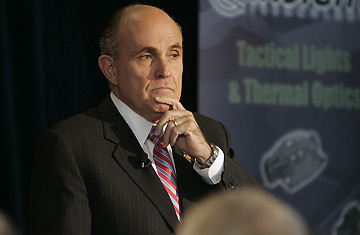
Republican presidential hopeful and former New York mayor Rudy Giuliani speaks at a town hall meeting in Londonderry, N.H., Monday Oct. 29, 2007.
He was nowhere to be found on stage, but Rudy Giuliani's campaign shrewdly rushed to declare victory after Tuesday night's Democratic debate in Philadelphia — chiefly because the former New York mayor emerged as the preferred whipping boy among the seven Democratic rivals.
Giuliani's name came up a few times, most notably when Sen. Joseph Biden called Giuliani the "most under-qualified man since George Bush to seek the presidency... I mean, think about it. Rudy Giuliani. There's... there's only three things he mentions in a sentence: a noun, a verb and 9/11."
Those lines played to laughs, and a member of Giuliani's team fired back quickly Tuesday night, noting that Giuliani, unlike Biden, "rarely reads prepared speeches, and when he does he isn't prone to ripping off the text from others," a reference to stump speeches Biden gave in 1987 that lifted heavily from campaign talks by the British Labor Party leader at the time.
But Biden's remarks were significant less for their humor than what they dramatized: Giuliani has become the Republican the Democrats seem to worry most about of late. As Rudy's position atop most national G.O.P. polls holds — and once-skeptical G.O.P. veterans give him points for proving more durable on the stump than many expected — he will come in for greater scrutiny from both sides.
Biden's argument against Rudy was actually substantive: He accused Giuliani of taking credit for improvements in crime in New York City during his tenure as mayor — improvements, Biden said, that should be laid at the foot of the 1994 crime bill, which put 100,000 new cops on the street and boosted both prison sentences and funds for rehabilitation of criminals. Much of the measure has been undercut by the Bush Administration — without so much as a peep from Giuliani, Biden said. In effect, Biden was calling the mayor dishonest.
Another possible vulnerability for Giuliani may turn out to be the makeup of his foreign policy team, which leans heavily in the direction of neo-conservatives who take a hard line with Iran — and who tend to think there was nothing ill-conceived about the invasion of Iraq. These include Norman Podhoretz, the author of the recently published World War IV, a book about the rise and dangers of Islamofascism, and Charles Hill, an aide to former Secretary of State George Shultz, among others. While Giuliani has stuck closely with the White House on the course of the war in Iraq, he has not taken as hard a line on Iran as some of these advisers. Yet by leaning so heavily on them for advice, Giuliani could put the much unloved and widely discredited neoconservatives back on stage as a campaign issue.
While Democrats tussled on Tuesday night about whether Sen. Hillary Clinton was forthcoming about the fate of 20 million documents in Little Rock's Clinton Library, Giuliani could face his own questions about the handling of archival material. On Sunday, The Chicago Tribune reported that associates of the former mayor arranged to have 2,100 boxes of documents from his tenure at City Hall copied and archived before they were returned to the city. The unusual chain of custody — since outlawed by New York City — raises questions about whether documents were deleted or sanitized.
And then there are questions of his follow-through on issues he's supposedly passionate about. Giuliani is likely to face questions as to why he agreed to serve on the bipartisan Iraq Study Group in 2005 but then quit the panel after just a few months.
It is almost axiomatic in some circles — mostly notably the Romney campaign — that Giuliani cannot survive all the scrutiny that will come with being perceived, rightly or wrongly, as the G.O.P. front-runner. But that remains to be seen, and given a choice, most candidates would certainly prefer scrutiny to obscurity. Most of the other Republicans, after all, went unmentioned in Philadelphia, save for Sen. Barack Obama's sly (but no doubt rehearsed) aside at the end of the night that he might don a Mitt Romney mask for Halloween. "It has," he said, "two sides to it."
